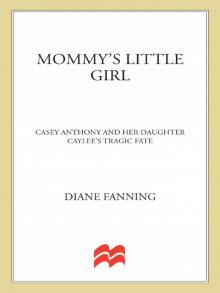- Home
- Diane Fanning
Bitter Remains Page 8
Bitter Remains Read online
Page 8
In the next section, Dr. Calloway made a number of recommendations, starting with the need for a guardian ad litem for the boys and consultation with a therapist as a follow-up with them. She also wanted little Grant to start preschool immediately and Gentle as soon as possible. She asked the court to mandate drug screens for both parents to determine that the children were safe until the guardian ad litem deemed them unnecessary. In doing so, she validated a request Laura had made in her parenting-history document, where Laura stated, “Because Grant III has been regularly partaking of drugs over the last twelve years of his life, I believe that he will continue to after our court case is over. I request that we do any testing possible. I also request that there be a system for following up on these tests after the court date is over.”
The current visitation arrangement, Calloway wrote, was “totally inappropriate for the age of the children.” She recommended split custody, a two-three-two plan. The children would be with one party for two days, the other for three days, then they would return to the first party for two days. The pattern would then start again with the second parent going first, creating an alternating week scenario.
For Laura, Calloway believed she should obtain a coach or parent substitute as a sounding board to help her with her insecurity, her sense of inadequacy and her anxiety—someone who could help her learn how to develop social networks and help train her in assertiveness. Also recommended was that she interact with a group of other single moms.
For Grant, Calloway suggested the same, but in his case, a coach who was trained in attachment theory and how to provide a better sense of reassurance and comfort to his children. In addition, she noted that he needed education on the significance of different developmental points. Then she wrote: “It is recommended that Grant be referred to a psychiatrist for evaluation regarding the question of a mood disorder or other possible explanations for the illogical, disturbed thinking he exhibits.” She went on to say that Grant needed a psychiatrist “knowledgeable about addiction and poly-substance abuse” because it appeared that Grant had “used multiple illegal drugs to self-medicate for an underlying mood or thought disorder.”
—
LAURA was ecstatic over the report. Sure, there were things she needed to address, but she had actually been hoping the evaluation would provide guidance on her most-needed areas for self-improvement. She took each point seriously and applied herself to reconciling her deficiencies as a parent. She felt the report vindicated a lot of things in her custody argument, and confirmed some of the allegations about Grant’s lack of parenting ability with the boys. As she told her friend and business partner, Chevon Mathes, “I got the psych eval back and I’m not the crazy one.”
—
GRANT was still in Hawaii when Amanda first thought she was going into labor. Her Braxton Hicks contractions felt so much like the real thing that Sha rushed her mother to the hospital. They were there until two in the morning, when the doctor determined that it was all just a false alarm. That night, Amanda bought a plane ticket for Grant, and he flew back the next day.
—
ON May 23, 2011, the custody attorneys had a conference with the judge and a trial date was set for August 15. Laura’s optimism rose even higher when John Sargeant assured her that the least the judge would do would be to comply with Dr. Calloway’s recommendation of shared custody, but that the court could take it further—the possibility that she would be awarded full custody of her sons was a realistic outcome.
Grant understood the tone of the report, too, and its consequences. He clearly knew he was going to have to give up at least some of his control over the boys, and thus, over Laura. His hostility about this new state of affairs seeped through his contacts with the mother of his children. The dark undertones of their interactions troubled her. Laura told her friend Heidi Schumacher, “If anything happens to me, even if I commit suicide or if I go missing or if I get into a car accident, know that Grant did it.”
—
ON May 24, 2011, Grant wrote to a fellow musician, Ashton, telling him that he had a “baby girl coming in a week so I’ve decided to take some time off until late August.” He then pitched him on his portrait special for the month of June. All he needed was a photograph and he’d deliver an 18"×24" charcoal for $250. He referred him to his website for examples.
The performer congratulated him and said he had one coming, too, according to his ex.
Grant fired back, “What!!! Is she crazy?”
“What you mean by that?” Ashton asked.
“My x Laura was crazy and I didn’t know it until it was too late. . . . She’s still putting me through hell.”
In addition to the portraits, Grant was scrambling for money in every way he knew how. His latest scheme—creating art for iPhone covers—was in the prototype phase. He specialized in drawings of dead rap musicians. He desperately wanted to get his special designs into the Apple Store—anything to keep him and Amanda afloat now that her savings were gone.
CHAPTER TWELVE
BUSY with complications in their lives, Laura Ackerson and Oksana Samarsky hadn’t touched base for a while by June 2011. Oksana’s work and class studies had gotten knocked off track by a medical crisis that required her to make two visits to the emergency room. Laura—torn between the additional classes she was now taking at the community college, the custody case, her two boys and trying to turn her fledgling businesses into successes—could relate.
Oksana replied to Laura’s e-mail sent a few days earlier: “Hi, are you there? I’m sorry it took me a few days to reply to your last e-mail.”
Laura had good news to report: “Should have my boys back in August and then some huge project”—i.e., her court case—“can come to a close.”
Oksana had good news, too. She told Laura she’d sold two small canvases for a thousand dollars on Facebook.
Laura cheered her friend’s news and suggested ways to expand her sales—even going so far as to volunteer to help set up the online infrastructure that Oksana needed to get more consistent sales. Oksana offered to pay her a commission.
Laura said, “Eh. I don’t need a percentage for it.”
“But you are helping!”
“Then send me a painting. Sign it, too?”
—
GRANT Hayes could be very reasonable and polite to Laura when he wanted something from her, and in early June he did. He asked her to keep the kids for a week, since Amanda was past her due date and about to give birth any moment, and caring for the boys was too demanding for her at this time. Laura was happy to comply. She switched up her work schedule and Chevon picked up the slack. The meetings with clients and potential clients that Laura had scheduled that week were all covered by Chevon using Laura’s car.
Amanda was additionally relieved to be free of that responsibility, because she suddenly had a new emotional burden to handle as well: on Sha’s twenty-second birthday—June 7, 2011—Amanda’s mother, Retha Faye Ryan Abernathy, passed away in her sleep at her Kirtland, New Mexico, home. She was seventy years old.
Sha and her boyfriend, Matt, had invited Amanda and Grant to join them for dinner to celebrate Sha’s birthday, and they kept the date despite Retha Faye’s death so that Sha could comfort Amanda. Grant met Matt for the first time, but it was a brief encounter. He dropped his wife at their table and announced he had to leave for an appointment in Morrisville. He exhibited no concern about Amanda’s loss.
Two days later, on June 9, Amanda gave birth, by cesarean section, to Lillian Ann Love Hayes—nine days past her due date. The next day, Laura brought Gentle and little Grant into the hospital to meet their new half sister.
—
THE economic situation in Grant and Amanda’s household had reached a critical point. There was no money coming in but plenty of it rolling out the door. No small economies would resolve their dilemma. They were not capable
of placing a deposit on a cheaper apartment. They had to take action before they were evicted and left stranded on the street with three children.
Grant’s parents owned a number of rental properties in Kinston but they were currently all occupied—some by other family members. The only option that remained was moving in and living with Patsy and Grant in their small house. The prospect of going back home had to seem like abject failure and it was not a feeling that Grant had the emotional strength to take in stride.
—
WHEN Grant didn’t need anything from Laura, things got ugly fast. On Wednesday, June 15, Laura met her kids at Monkey Joe’s to spend some extra time with them. She hugged them tight to say good-bye and the kids started to cry. They blubbered about not wanting to leave her, and Laura tried to comfort them with sweet words and kisses. Grant grew impatient with the emotional display. He jerked the children out of her arms and tossed them into the car while they cried. He told Laura that there would not be a midweek visit again.
Laura was distraught. She could not believe that Grant would be so rough and unfeeling to their boys and did not understand Grant’s attitude that it was best for them to leave her in an abrupt fashion.
That night she wrote to him: “I appreciate you allowing me to see our boys during your ordered time. Thank you. If you allow it in the future, could we please plan it so that you’re not ‘waiting an additional hour and a half for me.’ Or so I can say goodbye to my boys without being rushed. Thanks. Why don’t you use it as three hours of free time to take your wife out or do something for yourself. . . . I would like this to be a mutually beneficial thing—not just you ‘doing me a favor.’”
On June 20, Laura wrote again requesting another midweek visit, and that instigated another angry exchange of messages. Grant accused her of negligence or worse, claiming the boys always came back sick after being with her. Then they argued about financial issues. Laura accused Grant of using Amanda. “You were trying to convince Amanda that I was an evil, money-hungry woman out to ‘get you’ so that you could garner her sympathy and move to a quick emergency wedding, allowing you total access to her money in case she were to wise up. . . . What does it benefit you to have someone so ‘crazy’ in your past? Does it give you good stories? Or is it just good to manipulate and get sympathy with?” Laura mentioned that an earlier girlfriend of Grant’s had “bought it. Amanda’s buying it now. How far does the gravy train go? . . . Will I still be the enemy when you’re done with Amanda? Why don’t you put your energy into writing a sitcom about someone with Borderline Personality Disorder and get rich off your own back instead of trying to take advantage of women like Amanda?”
After that exchange, Grant denied Laura her requested midweek visit and accused her of using the boys as tools of manipulation. Then, he climbed on his high horse and claimed everything he was doing was for the sake of the two kids.
Laura ended her participation in the conversation by writing, “Grant, this is a power play for you. I’m not participating. . . . I guess I’ll have to wait until August when I ask for a different order. Thank you for being difficult once again.”
—
LAURA called her brother Jason at the end of June, but Jason was in line at the DMV and had to end the call abruptly. As she hung up, Laura said, “I love you.”
Laura and Jason never spoke again.
—
ON June 28, 2011, Laura met with her attorney, John Sargeant. He was impressed by how far she’d come with her personal development since they’d first met a year ago. Back then, her lack of self-confidence and her doubts about herself were apparent. Now, she was more poised and her career success was a point of pride. They discussed possible witnesses for the August hearing. Laura was eager for the date to arrive.
John Sargeant never saw his client again.
—
ON Friday, July 8, 2011, Laura picked up the boys a few hours earlier than usual. They had a lovely weekend. They played at home and at the bounce house at the park-and-play and did some shopping together. On Sunday morning, they went to a different church than usual so she could see whether they liked the Children’s Church. Laura was very pleased with their behavior. The proud mother wrote in her journal that little Grant “had a good weekend and four-day week. He watched fireworks and learned about space, compasses and how popsicles are really made. The boys got along really well and we used the system star charts that improve our interactions greatly.”
On Monday the eleventh, Laura swapped e-mails with a former boyfriend, James Harrison, telling him that she’d been in court with Grant for the past year. “I’ve heard that your twenties are the hardest compared with the rest of adulthood and I can definitely say mine have been rough but good.” She went on to express optimism about rebuilding her life, growing her business and being a single mother.
CHAPTER THIRTEEN
LAURA Ackerson spent most of Tuesday, July 12, 2011, with Chevon Mathes. The friends and business partners met at Laura’s apartment to work on their game plan for the next day. Then they went out to shop for a car for Chevon and run other errands. They returned to get more work done, and Chevon left for home about four o’clock that afternoon.
Earlier, while Chevon was still there, Laura also chatted with Oksana Samarsky, the artist whom she was helping to assemble a portfolio. Oksana asked how the custody case was going, and Laura wrote, “It’s going. I joined a group online of ladies in a similar situation—people who had to deal with assholes. LOL. And my situation is so, so, so, so good comparatively.” The two talked about tentative plans for the next day, when Laura hoped to visit her boys in Raleigh. They wanted to get together to talk about using Oksana’s artwork on cell phone covers and T-shirts.
“It might still be up in the air,” Laura typed. “I don’t know if I’ll see you or not. I have to figure out how to see my kids first and see how that goes.”
Oksana understood, saying that depending on the time she might not be able to make it herself because her study group would be meeting that evening.
“I’ll get back to you when I know when,” Laura said.
—
GRANT Hayes sent a response to Laura’s earlier message that night at 9:25: “If you want to try the midweek thing again, you can come up tomorrow. Let me know so I can make arrangements with Lauren [Harris, the manager at Monkey Joe’s]. I might not be able to stay the whole time because I have packing to do.”
Laura accepted his offer and asked how much time she’d have with them so that there would be no chance of an “overemotional goodbye.”
Grant blasted back that the decision to leave the last midweek visit was because the place was closing, not because of what he wanted. The kids, he said, were losing interest in the place anyway. He wrapped up by mocking her need for a prolonged good-bye.
Laura said the best thing would be to have a beginning and end time set in advance that included five to ten minutes for the transition. That, however, started another argument, which Laura brought to an end with a qualified apology, wrapping it up by writing: “It is the most frustrating thing I know of to deal with a parent partner who doesn’t view love in the same light that I do.”
—
AT ten that night, Grant Hayes wrote to Mark Gierth, a music promoter and his friend from St. John, telling him that he and Amanda wouldn’t be down in the United States Virgin Islands until late August because of “a court date for child support and shit. Nobody is going to give a black guy custody over a white girl and North Carolina ain’t gonna let me share custody unless I stay here and I just can’t make a living here. I’m just gonna let Laura keep the boys.” His plans after that, he said, were to move to St. Thomas with his wife and baby girl. He then asked about the number of days per week he’d be needed to perform if he returned to St. John.
Mark wrote back indicating that he’d be flying down over the weekend himself and really woul
dn’t know with any certainty until he was there.
Grant asked about a mutual acquaintance and whether or not she was still working in St. Thomas, because he was going to need to find a job for his wife, too.
Mark wrote, “I will need people . . . could fill gap till she finds something she really digs.”
CHAPTER FOURTEEN
ON Wednesday, July 13, 2011, Laura headed out for her sales calls. Building security cameras showed her walking out the black door of the entrance to her unit and down the stairs at 8:10 A.M. She wore a black sleeveless shirt and brown Capri pants and carried a brown Liz Claiborne purse and a black leather bag. It turned into an excellent day for business. Laura made successful presentations at Nash Street Grille, World Seafood, the Creamery Family Restaurant’s corporate office, Pup’s Steakhouse and Anthony’s Italian Restaurant.
She called Chevon after her first appointment to crow about her success.
Chevon urged her on. “You go, girl!”
Laura seemed to be nailing a sale every place she went. She called back several times to announce, “Hey! I got another one.”
Her success made her run a bit behind schedule. At 12:56 she sent a text message to Grant: “I can’t be there until after my last appointment in Wilson. When do you think they will be up?”
A few minutes after that, Laura wrote to Heidi Schumacher, who was on her way to a job interview in Charlotte, and told her that she was thinking about an idea for starting a new magazine in a big city. She asked Heidi to pick up any local or regional magazines she saw in Charlotte to see what was currently available. She moved on to her frustration with Grant and the upcoming custody hearing in August. “Do you think I should call on his ex-wife? I need to round up a few witnesses.”

 Death on the River
Death on the River Bitter Remains
Bitter Remains Gone Forever
Gone Forever Sleep My Darlings
Sleep My Darlings A Poisoned Passion
A Poisoned Passion Through the Window: The Terrifying True Story of Cross-Country Killer Tommy Lynn Sells (St. Martin's True Crime Library)
Through the Window: The Terrifying True Story of Cross-Country Killer Tommy Lynn Sells (St. Martin's True Crime Library) Chain Reaction
Chain Reaction Baby Be Mine
Baby Be Mine The Pastor's Wife
The Pastor's Wife False Front (Lucinda Pierce)
False Front (Lucinda Pierce) Under Cover of the Night
Under Cover of the Night Sabotage in the Secret City
Sabotage in the Secret City Written in Blood
Written in Blood Treason in the Secret City
Treason in the Secret City Wrong Turn
Wrong Turn Under the Knife
Under the Knife Mommy's Little Girl
Mommy's Little Girl Scandal in the Secret City
Scandal in the Secret City